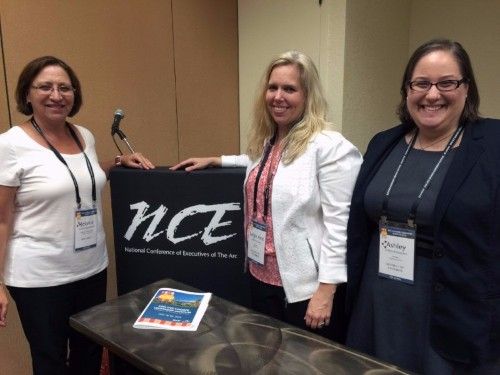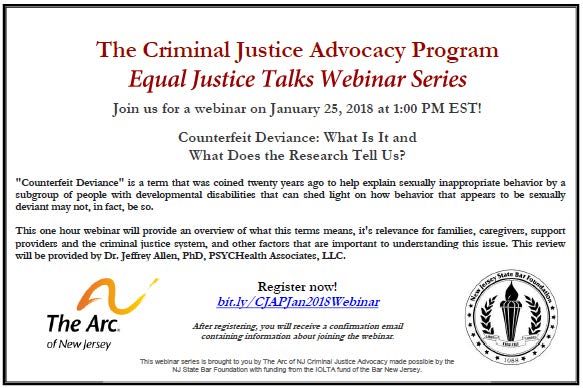
CJAP Director Jessica Oppenheim presented at the The Arc of the United States 2016 NCE Summer Leadership Institute.This session provided a brief introduction to Personalized Justice Plans, an overview of The Arc National's Center on Criminal Justice and Disability's Pathways to Justice Program, and other ways Chapters can improve their criminal justice advocacy efforts.
Click Here - Sign-up to receive email announcements for upcoming webinars!
2017-2018 Equal Justice Talks Webinar Calendar
- September 27, 2017 An overview of the criminal justice system and how it affects clients with developmental disabilities when criminal charges are filed - Recorded Webinar | Slides
- October 25, 2017 Effective techniques when working with a person with a developmental disability that affects their communication skills, providing practical tips and information - Recorded Webinar | Slides
- November 29, 2017 - Doing the Right Thing: Making Ethical Decisions and Preventing the Abuse, Neglect and Exploitation of People with Disabilities - Recorded Webinar | Slides
- December 20, 2017 - How Parents and Caregivers can Keep an Individual with I/DD Safe While Accessing the Internet. Recorded Webinar | Slides
- January 25, 2018 - Counterfeit Deviance: What Is It and What Does the Research Tell Us? Register Here | View Flyer
- February 22, 2018 - Description to be announced
- March 29, 2018 - Description to be announced
- April 26, 2018 - Description to be announced
- May 24, 2018 - Description to be announced
- June 28, 2018 - Description to be announced
This project is cosponsored by the New Jersey State Bar Foundation and made possible through funding from the IOLTA Fund of the Bar of New Jersey. For additional information about the Foundation's other law-related activities, please call 1-800-FREE-LAW or visit the Foundation on the Web at www.njsbf.org.

Members of the Statewide Pathways to Justice Task Force participated with The Arc of the US to launch our new training initiative for Law Enforcement, Service Providers and Attorneys at Monmouth Fire Academy on September 9, 2015.
Program Information
There are at least 25,000 people with intellectual disabilities in the nation's prisons, and some studies indicate that the actual number may be twice that. This means that approximately one out of every 20 prisoners in the United States has an intellectual disability.
Early identification of offenders who may have an intellectual disability is critical to providing appropriate treatment within the criminal justice system. Without knowledgeable advocates, offenders with developmental disabilities may not obtain equal justice.
Offenders with an intellectual disability face certain disadvantages at various stages of the criminal justice system:
- Arrested individuals with an intellectual disability often confess quickly, might say what they think a police officer wants to hear, and may not understand the implications of Miranda Rights.
- Most defendants with an intellectual disability more readily plead guilty to and are convicted of the arrested offense rather than a reduced charge.
- Inmates with an intellectual disability have more difficulty learning the rules and regulations of correctional facilities, which results in more accumulated rule infractions.
- Inmates with an intellectual disability are denied parole more frequently, serving on the average 2-3 years longer than non-disabled inmates convicted of the same offense.
The CJAP also serves as a clearinghouse for information about offenders with developmental disabilities and serves as a liaison between the criminal justice and human service systems, monitoring the quality of care and service provided to those with developmental disabilities as they move from one system to another.
The continuing challenge for the CJAP is to investigate ways in which linkages between these two systems can be established, strengthened and maintained.
Program Components:
Intervention, Advocacy, Case Management, Education, Training, Personalized Justice Plan (PJP)
INTERVENTION
Through its intervention, the Criminal Justice Advocacy Program helps to overcome the criminal justice system's lack of understanding of developmental disabilities by:
- Providing technical assistance to attorneys who represent these individuals
- Educating the criminal justice and human service systems about intellectual and related developmental disabilities, including the disadvantages faced by this population and the ways in which appropriate community supports can address their habilitative needs.
The Criminal Justice Advocacy Program seeks to ensure that defendants with developmental disabilities are guaranteed equal access to justice and fair treatment in the criminal justice system. The Program can intervene during any stage of a defendant's involvement with this system, including initial appearance, arraignment, pre-trial conference, trial, sentencing, correctional facility, pre-release planning and community.
Back
ADVOCACY
The Criminal Justice Advocacy Program provides advocacy services to individuals who, because of their disability, may not understand the process and procedures of the criminal justice system. The Program seeks to ensure fair and equal access to alternatives to incarceration and correctional habilitative programs, as well as a more coordinated system of follow-up and aftercare through specialized community release programs and services.
The Program also actively advocates for and supports legislation promoting the development of specialized programs and services for offenders with developmental disabilities and the protection of their rights.
Back
CASE MANAGEMENT
The Criminal Justice Advocacy Program provides Case Management Services as a way of monitoring individuals with developmental disabilities who become involved in the criminal justice system.
As soon as the Program receives a referral from the court, attorney, probation department, Department of Corrections, Division of Developmental Disabilities or any other public or private agency, a Personalized Justice Plan (PJP)is developed, immediately ensuring accountability for the individual's behavior while balancing the needs of the community.
The PJP serves as a Case Management tool that helps identify and coordinate relevant community services, thereby decreasing the fragmentation of these services as the individual passes from the criminal justice to the human service system.
Back
EDUCATION
The Criminal Justice Advocacy Program seeks to educate clients, the service providers, legal professionals and the community with regard to persons with developmental disabilities and the criminal justice system.
- Client Education: Because of the number of persons with developmental disabilities living in the community, educating them about appropriate citizenship is paramount. The Program adheres to a prevention model and strives to teach clients with developmental disabilities about citizenship and the law.
- Service Provider Information: Through presentations to service providers, the Program provides specific information about the special needs of persons with developmental disabilities and their at-risk status when involved in the criminal justice system.
- Criminal Justice Education: Through distribution of informational packets and advocacy letters, the Program educates the court system about offenders with developmental disabilities, and how these offenders can remain accountable for their criminal behavior while living in the community.
- Community Education: The Program educates the community about the needs of defendants with disabilities. Emphasis is on the effective use of the Personalized Justice Plan to assist persons with developmental disabilities who become involved in the criminal justice system.
TRAINING
The Program seeks to address the general lack of knowledge about developmental disabilities in the criminal justice system by providing generic and specialized training sessions to a number of target audiences, including defense and prosecuting attorneys, court officials, judges, police officers, parole officers, and community service agencies.
Training curricula are individually designed to meet the diverse needs and interests of the target audience.
Back
PERSONALIZED JUSTICE PLAN (PJP)
The Personalized Justice Plan is presented to the court system as an alternative to incarceration. It emphasizes the use of the least restrictive community-based alternatives to incarceration as early as possible in the criminal justice process, while holding individuals accountable for their behavior.
When presented as a special condition of probation or parole the PJP can help stabilize the individual in the community by identifying, coordinating and monitoring supports. Once a client is placed on probation or parole, the Program monitors the PJP until the client completes his or her sentence; monitoring can occur weekly, bi-weekly, monthly, or even annually, depending on the needs of the individual.
Every PJP increases the individual's accountability and responsibility in the community. In every case, the goal of the Criminal Justice Advocacy Program is to help the client successfully complete probation or parole.
Back
Archived Webinars

The Equal Justice Talk Webinar series is held on the third Thursday of every month.
-
Additional information authored by CJAP Director Jessica Oppenheim regarding Personalized Justice Plans
-
CJAP Director Jessica Oppenheim gives an overview of the Program and discusses the components of a Personalized Justice Plan (PJP). Included is a review of actual cases being served by CJAP.
-
People with disabilities are particularly vulnerable to inappropriate sexual activity as victims and suspects and many unique factors weigh into this equation. Dr. Beverly Frantz, Ed.D., will address these challenges, highlighting the concerns that must be addressed for the safety and welfare of individuals and the community when sex and sexuality intersect with the criminal justice system.
-
This hour long webinar, conducted by a seasoned New Jersey practitioner, will review the crucial elements of creating a report and will also address these challenges with practical, useful suggestions.
-
This webinar discusses critical issues for attorneys representing defendants with intellectual disabilities.
-
Individuals with dual diagnosis - both an intellectual/developmental disability and a mental health disorder - present unique challenges. This webinar discusses what dual diagnosis is, how it affects individuals and how to support them, as well as a practical discussion of the issues facing individuals with dual diagnosis.
-
CJAP Director Jessica Oppenheim, Esq. discusses issues the individuals with I/DD face when involved in the criminal Jusitce system
-
With speaker: Lida Pascual. Mental Health Clinician, Rutgers University Behavioral Health Care
-
Attorney Mark J. Mahoney, Esq., with the law firm of Harrington and Mahoney, provides an overview of issues concerning people on the Autism Spectrum and sexual offenses, particularly charges related to internet child pornography
-
Understanding and dealing with barriers to employment for people with I/DD and criminal histories with speaker Wesley E. Anderson, Director, Training & Consultations Services of The Arc of New Jersey

